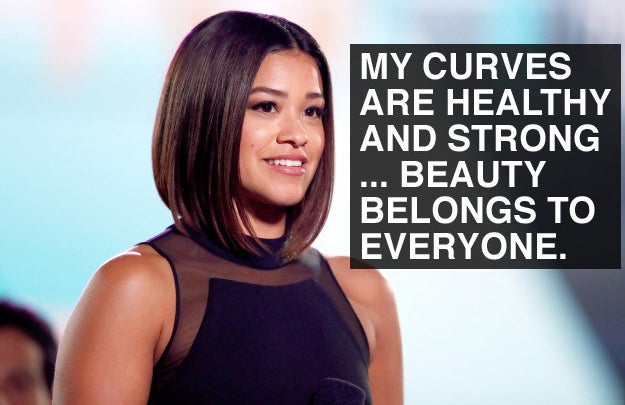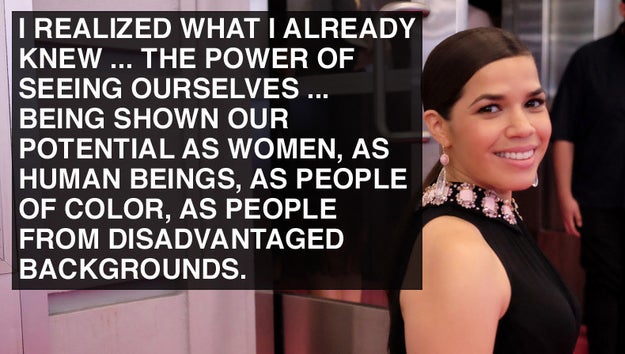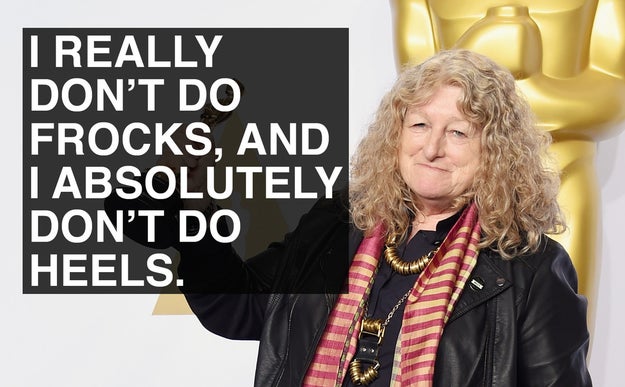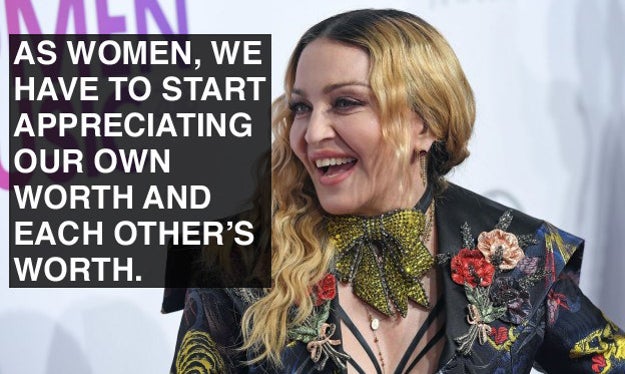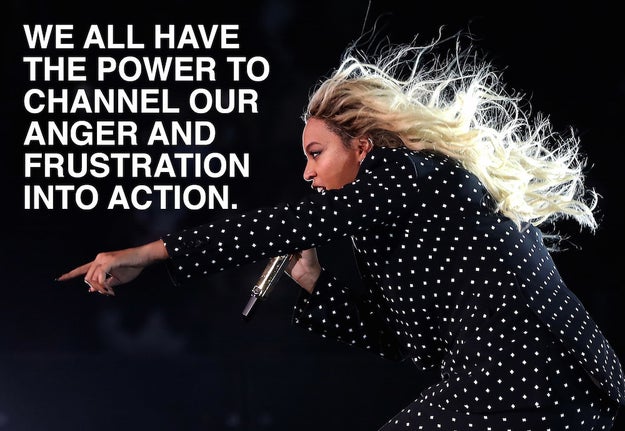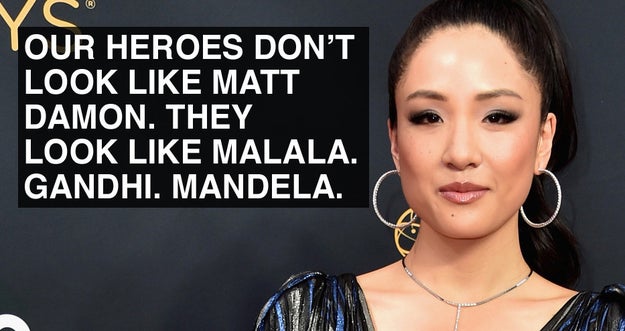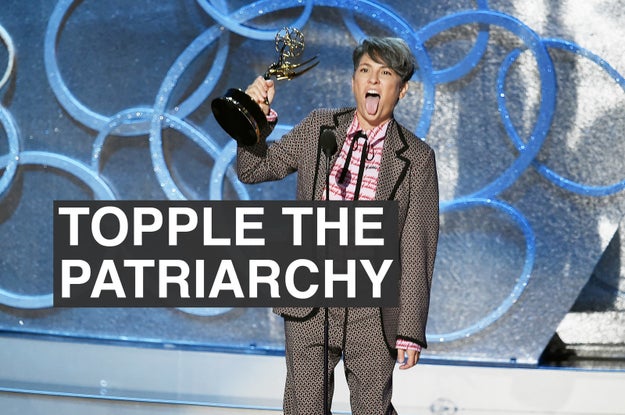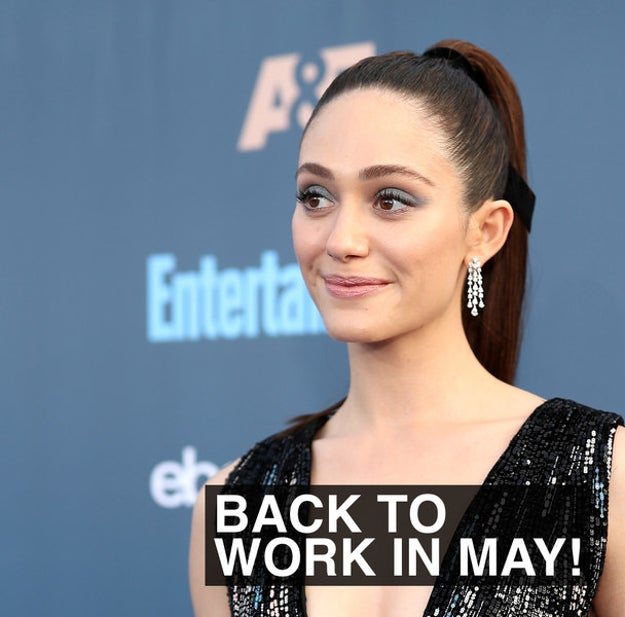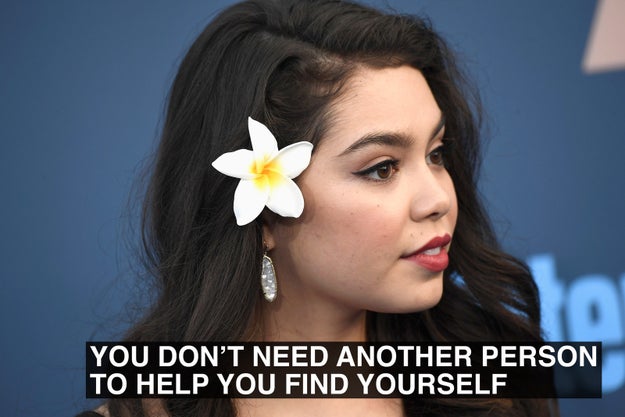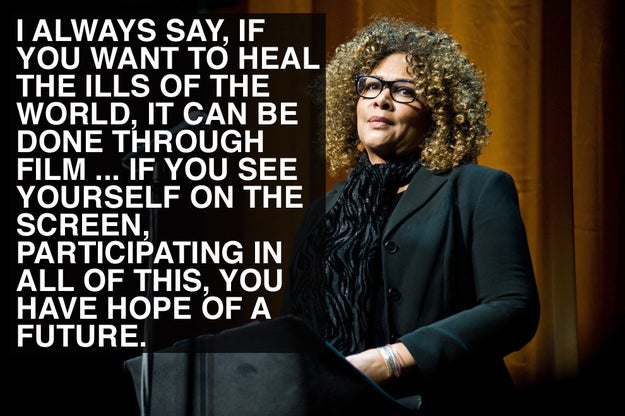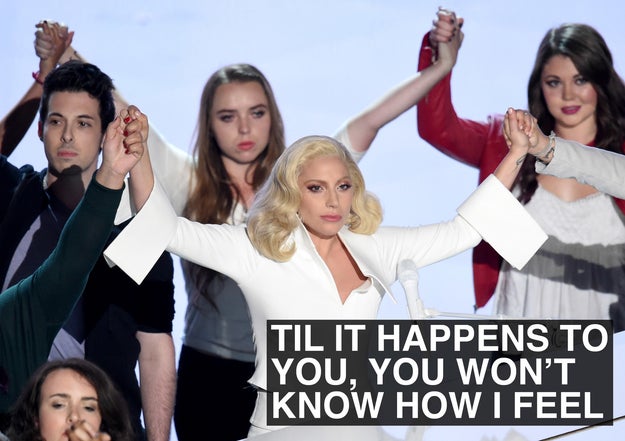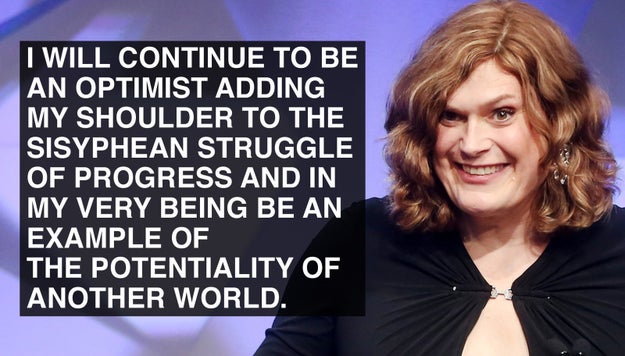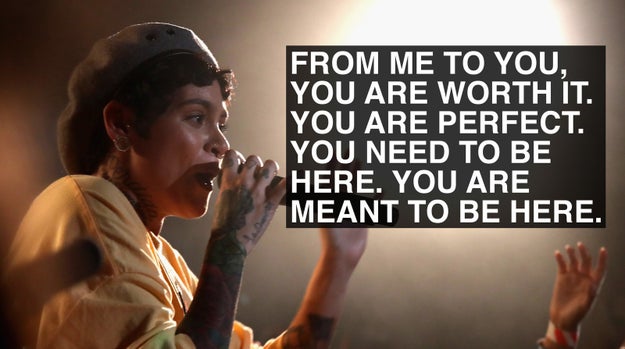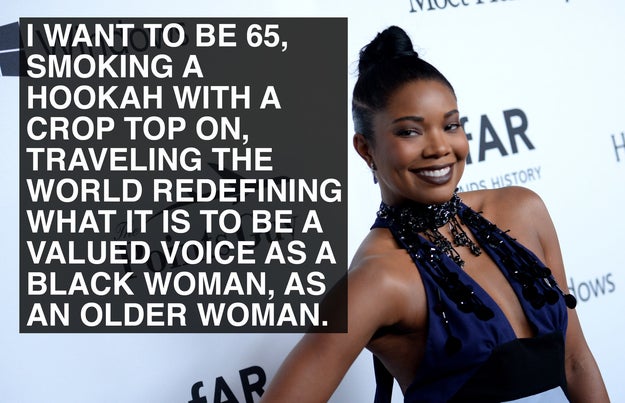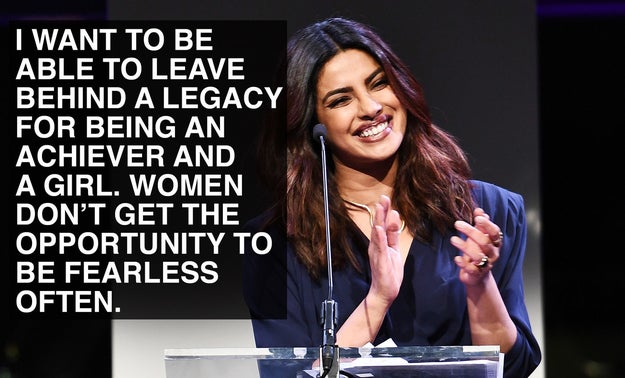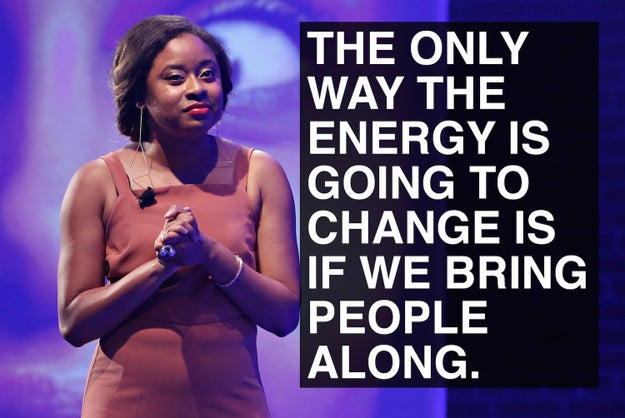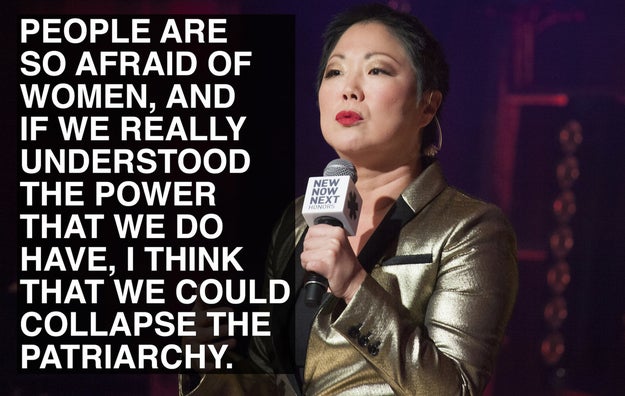
1. When Gina Rodriguez loved her body.
Looking at her cover of Women’s Health, the actor wrote, “My curves are healthy and strong and I work hard to feel good in my skin, I work hard to combat the images that make me go inward and destroy my self acceptance/confidence. No longer will I allow those lies to win. Beauty belongs to everyone.”
2. When America Ferrera became a force for change.
At an awards show hosted by the Feminist Majority Foundation, the actor said, “The very first film I did, Real Women Have Curves, received a response from so many — not just women, not just Latinas — all kinds of people from around the world who saw themselves. And I realized what I already knew as a young person: the power of seeing ourselves, being shown ourselves, being shown our own potential as women, as human beings, as people of color, as people from disadvantaged backgrounds. … It was then that I went from wanting to be a famous, successful actress to wanting my work to matter.”
3. When Jenny Beavan didn’t do heels.
The costume designer showed up to the famously chichi Academy Awards to claim an Oscar for Mad Max wearing a fake leather jacket and boots. She said, “I really don’t do frocks, and I absolutely don’t do heels. I simply can’t wear them. … I just like feeling comfortable. And I’m sorry, as far as I’m concerned, I’m really dressed up.”
4. When Madonna called out sexism.
Speaking at the Billboard Women in Music Awards, the iconic performer addressed her radical career — and the misogyny she’s faced: “There are no rules if you’re a boy. If you’re a girl, you have to play the game.
“What is that game? You are allowed to be pretty and cute and sexy, but don’t act too smart. Don’t have an opinion. Don’t have an opinion that is out of line with the status quo, at least. You are allowed to be objectified by men and dressed like a slut, but don’t own your sluttiness, and do not, I repeat, do not share your own sexual fantasies with the world. Be what men want you to be, but more importantly, be what women feel comfortable with you being around other men. And finally, do not age, because to age is a sin. You will be criticized, you will be vilified, and you will definitely not be played on the radio. …
“People say that I’m so controversial, but I think the most controversial thing I have ever done is to stick around. What I would like to say to all the women here today is this: Women have been so oppressed for so long, they believe what men have to say about them. And they believe they have to back a man to get the job done. … As women, we have to start appreciating our own worth and each other’s worth. Seek out strong women to befriend, to align yourself with. To learn from. To be inspired by. To collaborate with. To support. To be enlightened by.“
5. When Beyoncé urged us to stand up for justice.
The director and performer released a statement taking a stand against police brutality: “We don’t need sympathy. We need everyone to respect our lives. We’re going to stand up as a community and fight against anyone who believes that murder or any violent action by those who are sworn to protect us should consistently go unpunished. … This is a human fight. No matter your race, gender, or sexual orientation. This is a fight for anyone who feels marginalized, who is struggling for freedom and human rights. This is not a plea to all police officers but toward any human being who fails to value life. The war on people of color and all minorities needs to be over. Fear is not an excuse. Hate will not win. We all have the power to channel our anger and frustration into action.“
6. When Constance Wu knew who our heroes were.
Criticizing the whitewashing in The Great Wall, the actor wrote, “We have to stop perpetuating the racist myth that only a white man can save the world. It’s not based in actual fact. Our heroes don’t look like Matt Damon. They look like Malala. Gandhi. Mandela. Your big sister when she stood up for you to those bullies that one time.”
7. When Jill Soloway got political.
Accepting an Emmy for her show Transparent, the writer-director said, “When you take women, people of color, trans people, queer people, and you put them at the center of the story, the subjects instead of the objects, you change the world, we found out. … I always wanted to be part of a movement — the civil rights movement, the feminist movement. This TV show allows me to take my dreams about unlikable Jewish people, queer folk, trans folk, and make them the heroes. Thank you to the trans community for your lived lives. We need to stop violence against transgender women and topple the patriarchy! Topple the patriarchy!”
8. When Jessica Chastain rejected double standards.
After then–presidential candidate Hillary Clinton was criticized for seeming too prepared at a debate, the actor said, “Women should know that it’s okay to be over-prepared. … It doesn’t make them difficult, it doesn’t make them the b-word. To be over-prepared, to be ambitious, I think it makes them powerful.“
9. When Emmy Rossum got that back pay.
For seven seasons, Shameless paid Emmy Rossum less than her male co-star; Variety reported that before the eighth season, the show offered to pay her the same amount as her co-star, but she demanded that she be paid more to make up for the previous wage gap. Holding out for back pay apparently worked: In December, she tweeted, “Back to work in May!”
10. When Auli’i Cravalho didn’t need romance.
The star of Moana told People, “Everyone needs to take that time to figure out who they are. … You don’t need another person to help you find yourself.”
11. When Julie Dash saw the power of storytelling.
The director, whose exquisite 1991 film Daughters of the Dust was a major influence on Beyoncé’s Lemonade, told the Stanford Daily, “But I always say, if you want to heal the ills of the world, it can be done through film. … The real stories with depth and complexity. Characters with foibles and strength. If you see yourself on the screen, participating in all of this, you have hope of a future.“
12. When Lady Gaga spoke out against sexual violence.
Lady Gaga, who is a sexual assault survivor, sang her Oscar-nominated ballad “Til It Happens to You” at the Academy Awards, belting out the final lines as she was surrounded onstage by fellow survivors: “Til it happens to you, you won’t know how I feel.”
13. When Maysoon Zayid was unapologetically proud.
At a Beachbody summit, the commentator and comedian described what happened after her first MSNBC appearance: “I did what any egomaniacal actress would do — I googled myself. And I got the shock of a lifetime. The people on the clips weren’t saying what a great job I did; they weren’t commenting on how shiny my hair was. America was playing a game of ‘guess what’s wrong with her.’
“See, Keith Olbermann and I had never discussed my disability: We were talking about politics; cerebral palsy wasn’t the subject at hand, so we didn’t think we needed to address it. But apparently people are so not used to seeing disabled people onscreen talking about anything but disability that they decided it was okay to diagnose me. And they wrote things like, ‘Oh my god, that girl is wasted. Is she retarded? It looks like Botox gone wrong. Maybe it was an honor killing that they failed to finish.’ Or my favorite one, ‘Poor crooked mouth Gumby terrorist. We should pray for her.’
“And I had to make a decision. I had never been bullied in my life. I grew up surrounded by people who told me ‘Yes you can-can.’ I grew up surrounded by people who treated me as an equal, and here I was being called disgusting, being called a terrorist, having people threaten my life and threaten to assault me because I had the gall to be disabled and proud and go out on television and make no apology. In that moment, I decided I could never quit, because maybe if there were more positive images of disability on television, we would face less hate and fear in the real world.”
14. When Lilly Wachowski was angry, bold, and poised.
Under circumstances she would not have chosen, the writer-director came out as a transgender woman with humor and grace. She wrote in the Windy City Times, “Now, gender theory and queer theory hurt my tiny brain. … I have a quote in my office though by Jose Muñoz, given to me by a good friend. I stare at it in contemplation sometimes trying to decipher its meaning but the last sentence resonates: ‘Queerness is essentially about the rejection of a here and now and an insistence on potentiality for another world.’ So I will continue to be an optimist adding my shoulder to the Sisyphean struggle of progress and in my very being, be an example of the potentiality of another world.”
15. When Kehlani called for empathy.
Months after a suicide attempt, Kehlani spoke to her fans about depression and urged those struggling with mental health problems to seek help: “Please, don’t try it, don’t do it. … If you have a friend and they’re scaring you a little, just love them. Just hug them, and love them up, and tell ‘em that it’s good, okay? And from me to you, you are worth it, you are perfect, you need to be here, you are meant to be here.”
16. When Gabrielle Union looked to the future.
The actor told Time, “I want to be 65, smoking a hookah with a crop top on, traveling the world, redefining what it is to be a valued voice as a black woman, as an older woman. There are so many dope women that are blazing a number of trails ahead of me, I don’t think it’s going to be as hard as I’m making it sound. I’m over 40 and I’ve never had this many opportunities. What’s next? And who can I bring with me? It’s not enough for me to be there. I want everyone to be in the room with me.”
17. When Priyanka Chopra was daring.
The actor told the Hindustan Times, “I want to be able to leave behind a legacy for being an achiever and a girl. Women don’t get the opportunity to be fearless often. We always have to end up being dependent on men, in a lot of ways, because we live in a male-dominated world.”
18. When Phoebe Robinson paved the way.
The comedian, writer, and actor said, “I like being in front of the camera, performing — but I would like to get to a place where I’m also executive producing and bringing other people along. People of all different walks of life, highlighting their voices. I feel like the only way the energy is going to change is if we bring people along. And you have to help change it. You can’t wait for the gatekeepers to change it because they’re not, really.”
19. When Margaret Cho raged.
Speaking to Another Round, the performer said, “I am healed by the cathartic power of rage, and anger serves as my bodyguard. I’m unafraid to hit and unafraid to call out bad stuff when I see it, and I’m unafraid to make a fuss and scream about it. People are so afraid of women, and if we really understood the power that we do have, I think that we could collapse the patriarchy. We already have done a good job at starting to dismantle it. But if we really recognized our own rage as positive strength, it could be revolution.”


